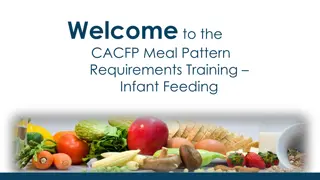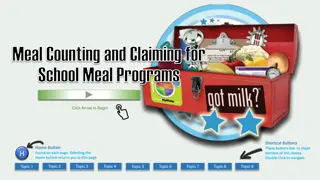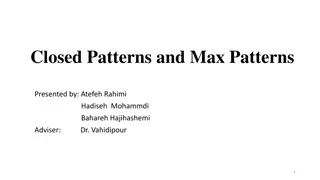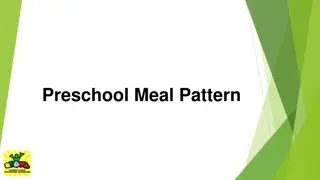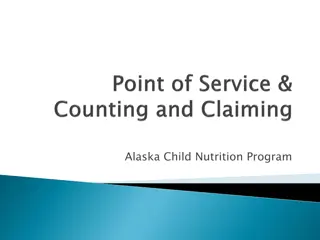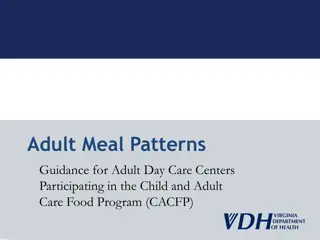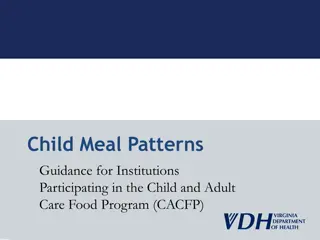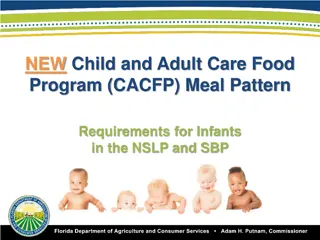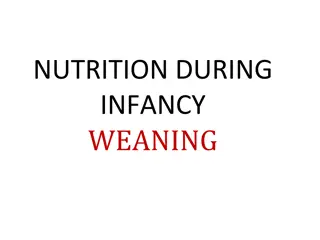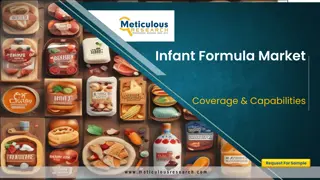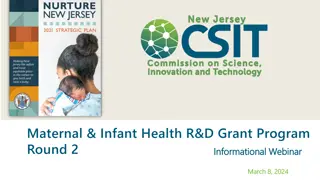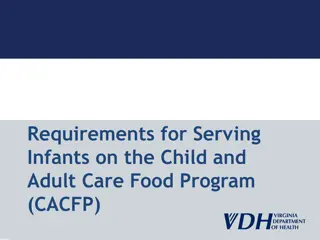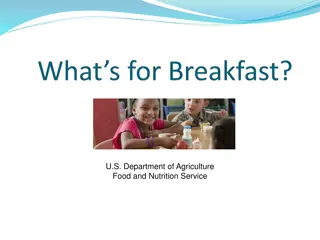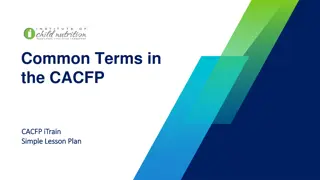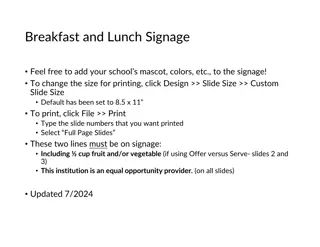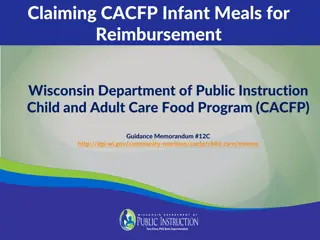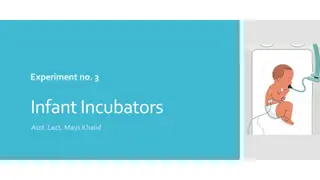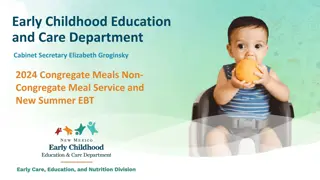Offer vs. Serve Training for School Food Authorities
Learn about Offer vs. Serve (OVS) meal service option for School Food Authorities, allowing children to decline some food items in reimbursable meals. Discover how OVS reduces food waste and costs with proper implementation. Training is essential for staff to assist children in selecting a reimbursa
1 views • 39 slides
Insights on Infant Mortality and Safe Sleep Practices in Illinois
Exploring the definitions of infant mortality and safe sleep practices, this content delves into the Infant Mortality Ratio (IMR) and Sudden Unexpected Infant Death (SUID) Mortality Ratio. Data sources such as vital records and the Pregnancy Risk Assessment Monitoring System (PRAMS) shed light on th
0 views • 57 slides
CACFP Infant Feeding Meal Pattern Requirements Training Overview
The training material covers the Child and Adult Meal Pattern Requirements, emphasizing a wider variety of protein options, more fruits and vegetables, whole grains, and less added sugar and saturated fat. It details the Infant Meal Pattern Requirements, encouraging breastfeeding and promoting devel
2 views • 58 slides
Understanding Offer Versus Serve (OVS) Training for School Food Authorities
Offer Versus Serve (OVS) is a meal service option available for approved School Food Authorities (SFAs) in the Summer Food Service Program (SFSP). OVS allows children to decline certain meal components, reducing food waste and costs when properly implemented. However, it is crucial to adhere to meal
0 views • 41 slides
Planning with CSC Continuum of Welsh Language Patterns
This session by Mathias Maurer provides information and examples to support planning with the CSC Continuum of Welsh Language Patterns. It covers introducing new language patterns, transferring familiar patterns to new contexts, planning for progression, and utilizing the continuum for coherent deve
1 views • 44 slides
Understanding Deminimus Meal Expense Reports
Deminimus meal expense reports play a crucial role in documenting and justifying meal expenses incurred in business settings. These reports cover various types of meals, such as local, entertainment, and deminimus events, outlining the guidelines and procedures for creating and documenting expenses.
0 views • 28 slides
Understanding Patterns of Behaviour in Zoology: An Overview
Behaviour in animals encompasses a wide range of responses to stimuli in their environment, with patterns that can be innate or learned. This comprehensive overview explores the different behavioural patterns, including tropism, taxis, reflexes, instincts, learning, and reasoning. The importance of
0 views • 17 slides
Understanding Frequent Patterns and Association Rules in Data Mining
Frequent pattern mining involves identifying patterns that occur frequently in a dataset, such as itemsets and sequential patterns. These patterns play a crucial role in extracting associations, correlations, and insights from data, aiding decision-making processes like market basket analysis. Minin
1 views • 95 slides
Year 2 Mathematics Geometry Patterns and Sequences
Exploring 2D and 3D shape patterns, ordering and arranging mathematical objects in sequences. Tasks involve continuing rotation patterns, mental math exercises, and creating unique shape patterns. Emphasis on rules for patterns and developing critical thinking skills in geometry.
1 views • 18 slides
Understanding Preterm Labor and Its Impact on Infant Health
Preterm labor, defined as the delivery of an infant before 37 weeks of gestation, presents risks such as incomplete organ system development and increased infant mortality rates. Unnecessary obstetrical interventions before 38-39 weeks should be avoided. The trends in preterm birth rates reveal disp
0 views • 68 slides
Meal Counting and Claiming for School Meal Programs
Participants in this course will learn about the essential elements of an acceptable meal counting and claiming system for school meal programs. Topics covered include eligibility documentation, collection procedures, point of service meal counts, reports, claims for reimbursement, and internal cont
0 views • 21 slides
Understanding Closed Patterns and Max Patterns in Data Mining
Explore the concepts of closed patterns and max patterns in data mining, along with challenges and solutions. Learn how closed patterns compress frequent patterns while maintaining support information, and how max patterns provide a lossy compression. Discover the difference between closed patterns
0 views • 10 slides
Fun with Patterns: Exploring Creativity and Logic in Mathematics
Dive into the world of patterns with this interactive mathematics chapter, learning how to identify, extend, and create patterns using everyday objects like flowers and leaves. Explore the art of pattern-making, discover the magic of number patterns, and engage in hands-on activities to enhance your
0 views • 39 slides
Preschool Meal Pattern Guidelines
Learn about the importance of serving reimbursable meals in preschool programs, following federal requirements for reimbursement. Understand the components that make a meal reimbursable and the consequences if any components are missing. Explore the meal patterns for preschool breakfast and lunch, i
0 views • 21 slides
UMBC Meal Request Guidelines
Navigate the meal request process at UMBC with ease. Explore meal policies, reimbursement details, pre-approval forms, and key requirements for catered events. Access training resources and find essential information on employee-only meal payments. Discover how to get reimbursed for meals involving
0 views • 18 slides
Pediatric Safety Updates: Sleep-Related Infant Deaths Overview
Sleep-related infant deaths, including Sudden Infant Death Syndrome (SIDS) and accidental suffocation, remain a significant concern with over 3500 infant deaths in the US annually. Risk factors such as prone positioning, bed-sharing, premature birth, and maternal tobacco use contribute to these trag
1 views • 42 slides
Alaska Child Nutrition Program: Meal Counting & Claiming Systems
Explore the Alaska Child Nutrition Program's guidelines on acceptable point of service counting and claiming systems, along with eligibility documentation, meal counts, and reimbursement procedures. Learn about acceptable meal counting systems and the importance of maintaining accurate records for f
1 views • 37 slides
Infant Phonetic Development: Stages and Characteristics
Infant phonetic development progresses through distinct stages, from basic biological noises like crying to babbling and beyond. Each stage highlights vocal milestones such as cooing, vocal play, and babbling, leading to the expansion and contraction of phonemes. The transition to melodic utterance
0 views • 5 slides
Adult Day Care Meal Patterns Guidance for CACFP Participation
Providing well-balanced meals is crucial for adult day care centers participating in the CACFP. The meal pattern requirements ensure menus meet nutritional needs, align with Dietary Guidelines for Americans, and offer appetizing variety. Components for breakfast, lunch, supper, and snacks must be in
0 views • 26 slides
Child Meal Patterns Guidance for CACFP Participants
Child Meal Patterns Guidance for Institutions in CACFP aims to ensure well-balanced meals for children, meeting nutritional needs and aligning with Dietary Guidelines. The program specifies components required for breakfast, lunch/supper, and snacks to qualify for reimbursement. Menu planners must c
0 views • 26 slides
The Impact of Cigarette Taxes and Indoor Air Laws on Prenatal Smoking and Infant Death
This study examines the effects of cigarette taxes and indoor air laws on prenatal smoking and infant death. It discusses how cigarette taxes can increase smoking cessation during pregnancy and reduce the probability of smoking, while comprehensive smoking bans can decrease the likelihood of smoking
1 views • 27 slides
New Infant Meal Pattern Requirements in the CACFP for NSLP and SBP
This training covers the new Infant Meal Pattern Requirements in the Child and Adult Care Food Program (CACFP) for infants in the National School Lunch Program (NSLP) and School Breakfast Program (SBP). It includes information on the regulatory process, implementation plan, two age groups for infant
1 views • 30 slides
Nutrition Guidelines for Weaning Infants
When introducing solid foods to infants starting at six months, it is important to remember that breastmilk remains a vital part of their diet. Weaning helps in the development of the infant's intestinal tract and the ability to digest proteins, fats, and carbohydrates. However, weaning too early or
0 views • 55 slides
The Infant Formula Market is expected to reach $77.09 billion by 2031
Infant Formula Market Size, Share, Forecast, & Trends Analysis by Product Type (Infant Milk, Specialty Milk), Nature (Inorganic, Organic), Form (Powder, Ready-to-Feed), Distribution Channel (Supermarkets\/Hypermarkets, Online) - Global Forecast to 20
1 views • 10 slides
Maternal & Infant Health R&D Grant Program Round 2 Information
The Maternal & Infant Health R&D Grant Program Round 2 aims to support innovation in technology, therapeutics, and solutions for maternal and infant health challenges in New Jersey. Target industries include Life Sciences, Technology, and Food & Beverage. The program offers competitive grants of up
0 views • 15 slides
CACFP Infant Meal Program Requirements
The Child and Adult Care Food Program (CACFP) outlines specific requirements for serving infants, including providing iron-fortified infant formula, cereal, and developmentally appropriate foods. Training objectives cover meal components, formula choices, and defining "developmentally ready." Center
0 views • 16 slides
Understanding Common Thought Patterns in Communication
Common thought patterns in communication help structure messages effectively to increase understanding and engagement. Recognizing these patterns benefits readers by enhancing comprehension, engagement, recall, and writing skills. The five most common thought patterns are list, sequence, definition,
0 views • 16 slides
Overview of U.S. Department of Agriculture Food and Nutrition Service Meal Patterns
The U.S. Department of Agriculture Food and Nutrition Service implements meal pattern changes for school meals, including requirements for fruits, vegetables, grains, milk, and calorie limits. Changes in specific school years, such as offering only fat-free and low-fat milk, increasing whole grains,
0 views • 25 slides
Understanding Common Terms in CACFP Meal Patterns
Explore common terms related to CACFP meal patterns, including meal pattern definitions, food components, minimum serving sizes, and creditable foods. Learn how these terms play a crucial role in meeting the program's requirements and providing nutritious meals for participants.
0 views • 27 slides
Step-by-Step Guide to Infant Bathing Process
This comprehensive guide provides detailed steps on how to bathe an infant effectively, emphasizing the importance of cleanliness, stimulation, comfort, and observation. It covers the necessary equipment, procedure steps from handwashing to dressing the infant, and emphasizes proper techniques for w
0 views • 10 slides
Understanding School Policies on Unpaid Meal Charges
Explore the history, requirements, and communication of school policies related to unpaid meal charges, as mandated by the Healthy, Hunger-Free Kids Act of 2010. Learn about local meal charge policies, the importance of having a written policy, and the communication efforts required to ensure all ho
0 views • 16 slides
Introduction to Design Patterns: Understanding GOF Patterns
Explore the world of design patterns with a focus on Gang of Four (GOF) patterns. Understand the essence of design patterns, learn about GOF patterns, and discover how to select, apply, and use these patterns effectively. Dive into the fundamentals of design patterns, including creational and struct
0 views • 115 slides
School Breakfast and Lunch Signage with Nutritious Meal Components
Customize your school's breakfast and lunch signage with the included food components for a nutritious meal. Choose from a variety of options including vegetables, grains, milk, meat/meat alternates, and fruits to ensure a balanced and healthy meal for students. The signs also remind that the instit
0 views • 5 slides
Reimbursement Guidelines for Claiming CACFP Infant Meals in Wisconsin
Guidance memorandum #12C from the Wisconsin Department of Public Instruction outlines the process for claiming reimbursement for infant meals in the Child and Adult Care Food Program (CACFP). The document covers meal requirements, record-keeping, and meal patterns for infants aged birth through 7 mo
0 views • 28 slides
Understanding Infant Incubators: Essential Information for Newborn Care
Infant incubators play a crucial role in maintaining a healthy environment for newborn babies, especially premature or sick full-term infants. These devices control temperature, humidity, and oxygen levels to create a neutral environment that supports optimal growth and development. This article cov
0 views • 9 slides
Meal Service Flexibility in Early Childhood Education and Care Department
The Early Childhood Education and Care Department, under Cabinet Secretary Elizabeth Groginsky in 2024, offers meal service flexibility including congregate and non-congregate meal options. Sponsors in good standing can operate non-congregate meal services and conditional sites may qualify for progr
0 views • 12 slides
Meal Plans and Policies Information by Lorena Giesbrecht
Discover all the essential information about meal plans, cancellation policy, rollover policy, and what you need to know before signing up. Learn how to check your meal card balance and where to go to enroll in a meal plan at Lorena Giesbrecht's facility.
0 views • 6 slides
UMBC Meal Policies and Reimbursements
UMBC meal policies cover various aspects such as meal approval forms, reimbursement guidelines, catering events, and per diem rates for faculty and staff. The policies ensure compliance with fiscal procedures and provide clarity on meal expenses for UMBC personnel and non-UMBC individuals. Proper do
0 views • 16 slides
Role of Public Health Nurse in School Meal Programmes
School meal programmes play a crucial role in improving the nutrition and health of children attending school. This article discusses the historical background, challenges, and implementation of school meal programmes globally, with a specific focus on Nigeria. It highlights the significance of prov
0 views • 46 slides
Analysis of Maternal and Infant Mortality Rates in Rwanda
The analysis explores the differences between national and international reported indicators such as Maternal Mortality Ratio, Infant Mortality Rate, and Antenatal Care Coverage in Rwanda. It discusses challenges in data collection, potential underreporting, and misclassification affecting maternal
0 views • 8 slides


